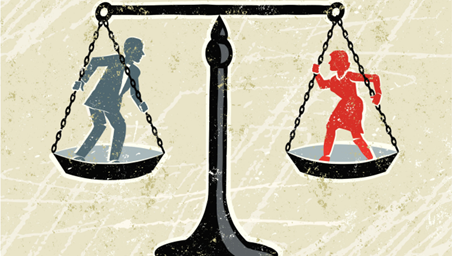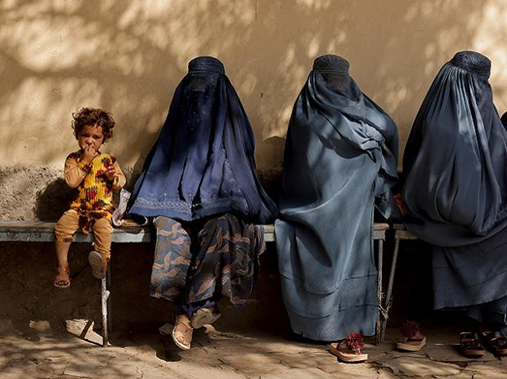WOMEN RIGHTS
WOMEN'S RIGHTS IN INDIA
WRITTEN BY: SUKRITI DUBEY
3RD YEAR BBA LLB
CHANDERPRABHU JAIN COLLEGE OF HIGHER
STUDIES AND SCHOOL OF LAW, GGSIPU
EDITED BY: YASH JAIN
5TH YEAR B.B.A.LL.B.(H)
AMITY LAW SCHOOL, NOIDA
Introduction
Swami Vivekananda, India’s patriotic
saint, quoted, “There is no chance for the welfare of the world unless the
condition of women is improved, and it is not possible for a bird to fly on
only one wing.”
Women are the one of that gender who
is an unshielded group of society. They had faced a lot of, discrimination,
domestic violence, ill-treatment, and exploitation and still, some are facing
it. Not just in India, but in the whole world, women want dignity, respect, and
opportunity same as men.
India is a democratic country. It
has one of the most lengthy and detailed constitutions. And now, Indian
legislation came with strict provisions from time to time which changed some of
the women's daily life circumstances too. There are lots of rights of women
including equal pay for equal work, right to dignity and decency, right against
workplace harassment, right against domestic violence, right to get free legal
aid, freedom from arrest at night, right to register virtual complaints, right
against indecent representation, right against stalking, etc.
If we see the tolerance rate in any
gender of India from the past to till now then women are those who tolerate
stupid or illogical customs to biggest challenges like child marriage, dowry
death, sati pratha, etc. before, during, and after freedom, all people got
freedom but women till now didn’t get any freedom from their own culture,
custom restrictions which are partial, illogical, ill-treated to women.
Women's
rights under the constitution of India, 1949[1] include dignity, equality,
and freedom from discrimination, and other than the Indian constitution act,
1949[2]
there are lots of statutes governing the government of India like The Dowry
Prohibition Act, of 1961[3], The
Commission of Sati (Prevention) Act, 1987[4], The Protection of Women
from Domestic Violence Act, 2005[5],
etc. which talks about in favor of women's protections, rights, and their
well-being.
The structure of
family, values, and social norms are built which is against the equality
guaranteed by the Indian constitution. Sometimes this household inequality etc.
affects females a lot mentally, physically, and psychologically. Even educated
women fight for themselves and get justice. But those women are not educated
and not financially good, they have to tolerate what their family says and
wants them to do. There are so many laws but they have some conditions, and
exceptions that relate to religions, culture, etc. are not enough to protect
women. Even after more than six and half decades after the enactment of the Indian
constitution act, 1949 but still the uniform civil code is dead letter till
now. The five sets of personal laws are concerned Hindu, Muslim, Christian,
Jewish, and Parsi. But the main point is that it gives more power, dominance,
and favor to men instead of women.
Rights of women in India
- Right to
maintenance
Maintenance
is defined as the amount which is paid to the dependent wife, child, or parents
to maintain themselves. The amount can be paid either by doing one lump sum
payment or by way of monthly installments. Maintenance includes all the basic
necessities just like, food, shelter, health care facilities, clothes, etc. A
married woman has a right to take maintenance from his husband even after the
divorce but until she doesn’t remarry. The maintenance depends on the husband
or wife's standard of living, circumstances, and income.
The
sec. 125 of the code of criminal procedure, 1973[6]
talks about the husband having the responsibility to give maintenance to his
divorced wife until she doesn't terminate the marriage by doing adultery or
refusing to live with her husband without any reasonable reason, or they both
separate by mutual consent. Under this section, any woman from India who is
from any religion, caste, etc. can demand maintenance from her husband. The
Hindu Marriage Act, of 1955[7]
also gives facilities to women but only those who are Hindu. Whereas, the
Dissolution of Muslim Marriage Act, of 1939[8] gives
facilities to women but only those Muslims.
- Right to equal pay
Now,
we have gender-neutral laws. A male or female is entitled to the same pay for
the same work or work of similar nature. The equal remuneration act provides
ensuring about equal pay for the same work nature. In the context of
recruitment and service conditions, there shall be no discrimination on a
gender basis.
- Right to dignity
and decency
Dignity
and decency are the most important essence of every woman. If anyone tries to
disrespect her dignity, and decency and outrage her modesty then he will get
imprisonment.
Every
woman has the right to live with dignity, free from fear, violence, and
discrimination. The Indian laws provide some provisions which favor women,
protect them, and provide justice to them. Some provisions are like Sec. 354
which talks about outraging the modesty of women, Sec. 354A which talks about
sexual harassment, Sec. 354B which talks about intent to disrobe her, Sec. 354C
talks about voyeurism, Sec. 354D talks about stalking.
If
there is any case in which a woman is held as an accused of the case, she is
arrested but should be behaved and dealt with decently. Any woman can’t be
arrested after sunset or before sunrise except the special permission for
arrest from the magistrate by a women police officer. Her arrest and search
should be done by a woman police officer, and her medical check-up or
examination should be taken by a women medical officer or under the supervision
of a women medical officer. In a rape case, FIR should be filed by a woman
police officer.
- Right against
domestic violence
Every
woman is entitled to the right against domestic violence through the Protection
of Women from Domestic Violence Act of 2005[9]. Domestic
violence is not limited to only physical abuse it also includes mental, social, and economical abuse.
If
you are a daughter, wife, and live-in-partner and face any such abuses from your
partner, husband, and his relatives or from any person who is related to you by
adoption or blood and living with you under the same roof then you can file the
suit against them under the Protection of Women from Domestic Violence Act of
2005[10],
there are different types of remedies which provide justice to a woman. You
also may contact the woman helpline no. “1091” and register the complaint. You
can also approach the woman's cell in your area, they provide special help to
victims by lodging the case in front of the magistrate after completing the
drafting of the complaint in a proper manner.
You
can also approach FIR to the police. Since domestic violence becomes a
cognizable offense, police are bound to file a complaint and investigate the
matter, etc. If the police refuse to file the case without any valid reason then
you can approach the Superintendent of police, if they think that this matter
is necessary to disclose then they can investigate the matter or maybe compel
the police officer to file the case and look after it, if the superintendent of
police also refuses to file the case then you have right to approach the
magistrate having jurisdiction of your area and move your application under
sec. 12 of the Domestic violence Act with the help of a lawyer for seeking
desired reliefs against Domestic Violence which include custody and protection
orders etc.
Even
the Indian penal code, 1860[11]
helps to protect those women who are victims of domestic violence as sec. 498A,
which is against the husband or relatives, gives imprisonment, which may extend
to 3 years.
- Rights at
workplace
In
places, where more than 30 females then there should be facilities for care and
the feeding of children is mandatory. The supreme court of India and the
government of India ensure that there should be safe for women in the
workplace.
So,
if any person at your workplace demands you for sexual favor, shows some
sexual gesture that outrages the modesty of women, makes sexually colored
remarks, touches you inappropriately, or shows pornography these all constitute sexual harassment and you can file a complaint against these all to
internal complaint committee. An internal committee is a committee that is
required by each and every office or branch of an employer which is of 10 or
more employees. The district officer is also required to compose a local
complaint committee in each district.
Apart
from all these, sec. 354A of the Indian penal code of 1860[12]
talks about sexual harassment in which the imprisonment, may extend to 1-3
years.
- Right against
dowry
A
giving or taking system of dowry by the bride or groom or by their parents
after or before the marriage are offences under the dowry prohibition act, of 1961. “Dowry” means any property or any valuable security given or agreed to
give may be directly or indirectly by any person to another person. If any
person demands or abets someone to give or take the dowry then he/she may be
punished with imprisonment which is a minimum of five years and a minimum fine
be 15,000.
- Right to free
legal aid
Any
woman who is a victim is entitled to take free legal aid through the legal
services authorities under the legal services authorities Act, 1987[13]
until she can afford to take legal aid by herself. There are district, state, and national level legal services authorities in different districts, states,
and national.
- Right to private
defense
It
is just the most essential right of women for their safety and protection. Any
woman can hurt, grievously hurt or kill the accused from whom they are trying
to protect their body or someone’s body. They can kill the accused and laws
will not punish you but there are some conditions:-
1. Accused
were trying to cause grievous hurt or death
2. Accused
were trying to commit rape, kidnapping, or abduction.
3. Accuses were trying to throw or attempting to throw the acid.
Conclusion
Indian laws are the guard of every
woman. Indian legislation is still aware of making strict to strict laws which
help women to safe, feel free, and feel equally treated. It is our
responsibility to make aware of women’s rights to every woman no matter whether
she is from a village or city, young or old, etc.
[1] the
Indian constitution act, of 1949
[2] the
Indian constitution act, of 1949
[3] The
Dowry Prohibition Act, 1961
[4] The
Commission of Sati (Prevention) Act, 1987
[5] The
Protection of Women from Domestic Violence Act, 2005
[6] the Code
of criminal procedure, 1973
[7] The
Hindu Marriage Act, of 1955
[8] The
Dissolution of Muslim Marriage Act, of 1939
[9] The Protection of Women from Domestic
Violence Act, 2005
[10]The Protection of Women
from Domestic Violence Act, 2005
[11]The Indian penal code,
1860
[12]the Indian penal code
of 1860
[13]the legal services
authorities Act, 1987








Comments
Post a Comment